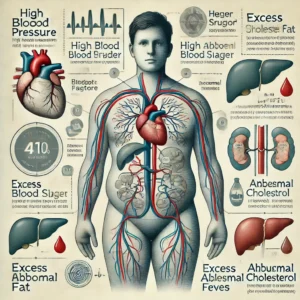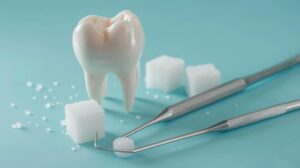Key Takeaways
- Metabolic syndrome is a group of risk factors that increase the chance of heart disease, stroke, and diabetes
- Oral health is closely linked to metabolic syndrome
- Regular dental check-ups can help detect early signs of metabolic syndrome
- Dentists can work with other healthcare providers to manage metabolic syndrome
- Lifestyle changes, including proper oral hygiene, can help prevent and manage metabolic syndrome
Metabolic syndrome is a cluster of conditions that occur together, increasing your risk of heart disease, stroke, and type 2 diabetes. As a faith-based family dental practice, we understand the importance of whole-body health and how it relates to oral care. Your dentist can play a crucial role in identifying and addressing metabolic syndrome.
The Connection Between Oral Health and Addressing Metabolic Syndrome

Gum Disease and Inflammation
Gum disease, also known as periodontal disease, is often linked to metabolic syndrome. The inflammation associated with gum disease can contribute to the overall inflammatory state seen in metabolic syndrome. Regular dental check-ups can help detect and treat gum disease early, potentially reducing the risk of metabolic syndrome.
Saliva as a Diagnostic Tool
Recent research has shown that saliva can be used as a non-invasive diagnostic tool for metabolic syndrome. Certain biomarkers in saliva can indicate the presence of metabolic syndrome, making your dental visit an opportunity for early detection.
How Your Dentist Can Help Identify Metabolic Syndrome

Oral Examinations
During routine dental check-ups, your dentist can look for signs that might indicate metabolic syndrome. These signs include:
- Dry mouth
- Bleeding gums
- Tooth decay
- Bad breath
While these symptoms alone don’t diagnose metabolic syndrome, they can prompt further investigation.
Blood Pressure Checks
Many dental offices now include blood pressure checks as part of their routine exams. High blood pressure is one of the key components of metabolic syndrome, and regular monitoring at dental visits can help catch this issue early.
The Role of Nutrition in Oral Health and Addressing Metabolic Syndrome

Sugar and Tooth Decay
A diet high in sugar not only contributes to tooth decay but also increases the risk of metabolic syndrome. Your dentist can provide guidance on reducing sugar intake, benefiting both your oral health and overall metabolic health.
The Importance of a Balanced Diet
A balanced diet rich in fruits, vegetables, and whole grains can help prevent both oral health issues and metabolic syndrome. Your dentist can offer nutritional advice tailored to your oral health needs, which often aligns with recommendations for preventing metabolic syndrome.
Lifestyle Changes to Addressing Metabolic Syndrome
Oral Hygiene Habits
Good oral hygiene habits, such as regular brushing and flossing, can help reduce inflammation in the body. This reduction in inflammation can have positive effects on metabolic health.
Exercise and Oral Health
Regular exercise is beneficial for both oral health and metabolic syndrome prevention. Exercise can help reduce inflammation, improve circulation, and maintain a healthy weight, all of which are important for both oral and metabolic health.
Collaborative Care: Your Dentist and Other Healthcare Providers
Referrals and Communication
If your dentist suspects you may have metabolic syndrome, they can refer you to a primary care physician or specialist for further evaluation. This collaborative approach ensures you receive comprehensive care.
Shared Treatment Plans
Your dentist can work with your other healthcare providers to create a shared treatment plan that addresses both your oral health needs and metabolic syndrome management.
Addressing Metabolic Syndrome and Dental Procedures
Special Considerations
Patients with metabolic syndrome may require special considerations during dental procedures. Your dentist will take into account factors such as:
- Blood sugar levels
- Blood pressure
- Medications you’re taking
This ensures safe and effective dental treatment.
Anesthesia and Metabolic Syndrome
Metabolic syndrome can affect how your body responds to anesthesia. Your dentist will consider this when planning any procedures that require sedation or anesthesia.
Prevention Strategies: Oral Health and Metabolic Syndrome
Regular Dental Check-ups
Regular dental visits allow for early detection of both oral health issues and potential addressing Metabolic Syndrome. We recommend visiting your dentist at least twice a year for check-ups and cleanings.
Stress Management
Stress can contribute to both oral health problems and metabolic syndrome. Your dentist can provide tips on stress management techniques that benefit both your oral and overall health.
The Impact of Sleep on Oral Health and Metabolic Syndrome
Sleep Apnea and Metabolic Syndrome
Sleep apnea, a condition often diagnosed by dentists, is closely linked to metabolic syndrome. Your dentist can screen for sleep apnea and refer you to a sleep specialist if necessary.
Teeth Grinding and Stress
Teeth grinding, or bruxism can be a sign of stress and is often associated with sleep issues. Addressing teeth grinding can improve both your oral health and potentially reduce risk factors for metabolic syndrome.
Medications for Metabolic Syndrome: Oral Health Considerations
Dry Mouth and Medication
Some medications used to treat components of metabolic syndrome can cause dry mouth. Your dentist can provide strategies to manage dry mouth and prevent associated oral health issues.
Drug Interactions
Your dentist needs to be aware of all medications you’re taking for metabolic syndrome to avoid potential drug interactions during dental treatments.
The Future of Dental Care and Metabolic Syndrome Management
Emerging Technologies
New technologies are being developed to help dentists play a more active role in metabolic syndrome management. These include advanced saliva testing and oral microbiome analysis.
Personalized Treatment Plans
As our understanding of the link between oral health and metabolic syndrome grows, dentists will be able to provide more personalized treatment plans that address both conditions simultaneously.
Metabolic Syndrome and Children: The Dentist’s Role
Early Detection in Pediatric Dentistry
Pediatric dentists can play a crucial role in the early detection of risk factors for metabolic syndrome in children. Regular dental check-ups can help identify issues like obesity and high blood pressure early on.
Education for Parents
Dentists can educate parents about the link between oral health and metabolic syndrome, empowering them to make healthy choices for their children.
| Metabolic Syndrome Component | Oral Health Impact | Dental Intervention |
|---|---|---|
| High Blood Pressure | Increased risk of gum disease | Regular cleanings and periodontal treatments |
| High Blood Sugar | Higher risk of tooth decay and oral infections | More frequent check-ups and fluoride treatments |
| Obesity | Increased inflammation affecting gum health | Nutritional counseling and oral hygiene education |
| High Cholesterol | Potential link to periodontal disease | Collaborative care with physicians |
| Oral Health Issue | Potential Metabolic Syndrome Indicator | Recommended Action |
|---|---|---|
| Persistent Bad Breath | Possible sign of diabetes | Referral to primary care physician |
| Dry Mouth | Potential medication side effect or diabetes | Saliva substitutes and further medical evaluation |
| Frequent Gum Infections | Possible compromised immune system | Comprehensive health assessment |
| Tooth Erosion | Potential gastroesophageal reflux disease (GERD) | Dietary counseling and medical referral |
Faith-Based Approach to Oral Health and Metabolic Syndrome
As a faith-based dental practice, we believe in caring for the whole person – body, mind, and spirit. This holistic approach aligns well with addressing metabolic syndrome, which requires attention to multiple aspects of health.
Community Outreach and Education
Our dental practice is committed to community education about the link between oral health and metabolic syndrome. We offer:
- Free educational seminars
- Participation in local health fairs
- Collaboration with local faith communities for health initiatives
The Importance of Regular Dental Visits
Regular dental visits are more than just about maintaining a healthy smile. For more information, you can visit our website or contact us. They’re an essential part of your overall health strategy, especially when it comes to metabolic syndrome.
Conclusion:
Your dentist can be a valuable partner in identifying, preventing, and managing metabolic syndrome. By maintaining good oral health and regular dental visits, you’re taking an important step toward overall health and well-being. Remember, a healthy mouth is often a sign of a healthy body.
